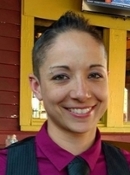Bille R. Tadros, Ph.D., is the latest addition to the Department of English and Theatre at the University of Scranton.
Tadros earned her Ph.D. in English from the University of Louisiana, Lafayette, and her M.F.A. in Writing from Sarah Lawrence College. She is the author of a book of poems, The Tree We Planted and Buried You In (Otis Books, 2018), and two chapbooks, inter: burial places (Porkbelly Press, 2016) and Containers (Dancing Girl Press, 2014). Her work has appeared in journals including Bone Bouquet, Crab Fat Magazine, Entropy, Fairy Tale Review, Lavender Review, and Tupelo Quarterly, and in the anthologies Bearers of Distance (Eastern Point Press, 2013), Women Write Resistance: Poets Resist Gender Violence (Hyacinth Girl Press, 2013), and The Queer South (Sibling Rivalry Press, 2014) and she is Co-Moderator of Mu Omicron, the local chapter of Sigma Tau Delta, the English Honor Society, all of this according to her profile on University’s main site.
I sat down with Dr. Tadros and asked her a few questions to introduce her in a personal way to the department. Here’s what she had to say.
As an undergraduate, did you know when going into college that you wanted to study English and creative writing?
“I knew I wanted to studying English and writing, but I don’t think I had any sense of how serious I was going to be about it until about my junior or senior year.”
When you were deciding to pursue a higher education, what factors lead you to focus on English and writing?
“A big part of it was probably my undergraduate study. So I went in as an undergraduate and decided to pursue a creative writing major and focus on that world. I don’t think I necessarily had any designs on higher education at that point, but by the end of my degree I realized that I wasn’t done; I had more to say and more to write. For me it has really been an emphasis on questioning what language can and can’t do and how important I think those conversations are. I feel really privileged to be in a position where I can facilitate that conversation.”
How does you identity affect your writing, your choice of reading and/or your general relationship with English?
“There is a question, that I’ve been asking myself for a couple years now, that kind of lives a little bit in the realm of disability studies and identity studies, which broadly is, “how do we write the body when we cannot right the body?” I’ve been thinking a lot about my own position as an embodied ‘right-er’ and what that means in relation to what I can bring to the page and what I can bring to conversations. I’m playing with that question. It’s a question that I’m bringing into the classroom as well. I think that’s a more specific version of the question I pose in all of my writing classes which is, “what can writing do and what can’t it do?”
What was special about the University of Scranton that made you choose to come here?
“The community, 100 percent. That’s what drew me right from the start. Everyone was so incredibly warm and welcoming. The weather when I came to visit was less, incredible so. But yes, that was unquestionably what got me at first and now that I’ve been teaching for a couple of week and have been getting to know my students, there’s definitely an energy and a curiosity that I’ve found in students here that excites me too.”
What advice do you have for students on the fence about studying English or writing?
“For those who are trying to decide if this is something that is worth pursing: When I was in graduate school I was taking an feminist literature class where we read a couple excerpts from Mary Ann Ferguson’s book, Images of Women in Literature. Ferguson says that literature both reflects and helps to create reality. This is the thing that I always come back to. That is why this matters. No matter who you are and no matter what you’re doing, the things that we write and read actually affect who we are and the world around us. They not only show us what’s happening in our own lives and what’s happening outside in the world, but they actually show us that we do have an impact. So if that’s not motivation enough to be an English major, I don’t know what is.”

